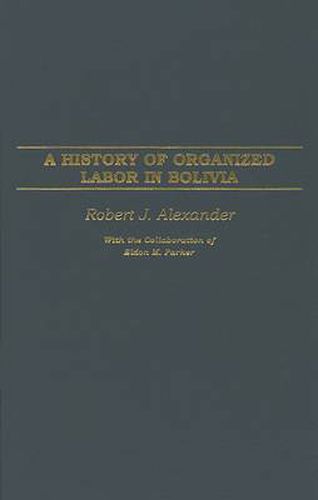Readings Newsletter
Become a Readings Member to make your shopping experience even easier.
Sign in or sign up for free!
You’re not far away from qualifying for FREE standard shipping within Australia
You’ve qualified for FREE standard shipping within Australia
The cart is loading…






Bolivia was the center stage for one of the most important Latin American social revolutions of the twentieth century, one that occurred amid a sea of tremendous political instability. The expansion of organized labor that occurred during the 1920s was met with multiple government reprisals and was largely curbed by the Chaco War with Paraguay of 1932-1935. Nevertheless, despite being compelled to operate illegally, the labor movement found support in several political parties, the most successful of which was the Movimiento Nacionalista Revolucionario, a powerhouse in the miners’ federation. Conscious of the remarkable upheavals which punctuated Bolivian history during the twentieth century, Alexander traces the relative successes of Bolivia’s labor unions, contextualizing their triumphs and disappointments within the captivating history of Bolivia’s tumultuous political scene.
Bolivia was the center stage for one of the most important Latin American social revolutions of the twentieth century, one that occurred amid a sea of tremendous political instability. The expansion of organized labor that occurred during the 1920s was met with numerous government reprisals and was largely curbed by the Chaco War with Paraguay of 1932-1935. Nevertheless, despite being compelled to operate illegally, the labor movement found support in several political parties, the most successful of which was the Movimiento Nacionalista Revolucionario, a powerhouse in the miners’ federation. Conscious of the remarkable upheavals which punctuated Bolivian history during the twentieth century, Alexander traces the relative successes of Bolivia’s labor unions, contextualizing their triumphs and disappointments within the captivating history of Bolivia’s tumultuous political scene.
Alexander explains how the labor movement evolved in the framework of several political changes, including:
the brief presidency of Major Gualberto Villarroel which began in December 1943 and lasted only two and a half years;
the Bolivian National Revolution which began on April 9, 1952; the onset of agrarian reform in 1952; the overthrow of the revolutionary regime in November 1964
$9.00 standard shipping within Australia
FREE standard shipping within Australia for orders over $100.00
Express & International shipping calculated at checkout
Bolivia was the center stage for one of the most important Latin American social revolutions of the twentieth century, one that occurred amid a sea of tremendous political instability. The expansion of organized labor that occurred during the 1920s was met with multiple government reprisals and was largely curbed by the Chaco War with Paraguay of 1932-1935. Nevertheless, despite being compelled to operate illegally, the labor movement found support in several political parties, the most successful of which was the Movimiento Nacionalista Revolucionario, a powerhouse in the miners’ federation. Conscious of the remarkable upheavals which punctuated Bolivian history during the twentieth century, Alexander traces the relative successes of Bolivia’s labor unions, contextualizing their triumphs and disappointments within the captivating history of Bolivia’s tumultuous political scene.
Bolivia was the center stage for one of the most important Latin American social revolutions of the twentieth century, one that occurred amid a sea of tremendous political instability. The expansion of organized labor that occurred during the 1920s was met with numerous government reprisals and was largely curbed by the Chaco War with Paraguay of 1932-1935. Nevertheless, despite being compelled to operate illegally, the labor movement found support in several political parties, the most successful of which was the Movimiento Nacionalista Revolucionario, a powerhouse in the miners’ federation. Conscious of the remarkable upheavals which punctuated Bolivian history during the twentieth century, Alexander traces the relative successes of Bolivia’s labor unions, contextualizing their triumphs and disappointments within the captivating history of Bolivia’s tumultuous political scene.
Alexander explains how the labor movement evolved in the framework of several political changes, including:
the brief presidency of Major Gualberto Villarroel which began in December 1943 and lasted only two and a half years;
the Bolivian National Revolution which began on April 9, 1952; the onset of agrarian reform in 1952; the overthrow of the revolutionary regime in November 1964